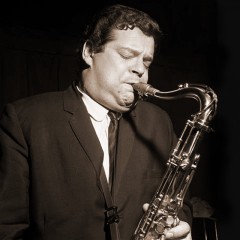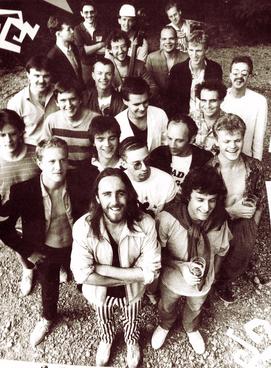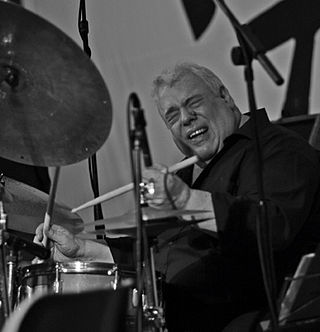Related Research Articles

Maxwell Lemuel Roach was an American jazz drummer and composer. A pioneer of bebop, he worked in many other styles of music, and is generally considered one of the most important drummers in history. He worked with many famous jazz musicians, including Clifford Brown, Coleman Hawkins, Dizzy Gillespie, Charlie Parker, Miles Davis, Duke Ellington, Thelonious Monk, Abbey Lincoln, Dinah Washington, Charles Mingus, Billy Eckstine, Stan Getz, Sonny Rollins, Eric Dolphy, and Booker Little. He also played with his daughter Maxine Roach, Grammy nominated Violist. He was inducted into the DownBeat Hall of Fame in 1980 and the Modern Drummer Hall of Fame in 1992.

Cecil Percival Taylor was an American pianist and poet.

John Arnold Griffin III was an American jazz tenor saxophonist. Nicknamed "the Little Giant" for his short stature and forceful playing, Griffin's career began in the mid-1940s and continued until the month of his death. A pioneering figure in hard bop, Griffin recorded prolifically as a bandleader in addition to stints with pianist Thelonious Monk, drummer Art Blakey, in partnership with fellow tenor Eddie "Lockjaw" Davis and as a member of the Kenny Clarke/Francy Boland Big Band after he moved to Europe in the 1960s. In 1995, Griffin was awarded an Honorary Doctorate of Music from Berklee College of Music.

Ronnie Scott OBE was a British jazz tenor saxophonist and jazz club owner. He co-founded Ronnie Scott's Jazz Club in London's Soho district, one of the world's most popular jazz clubs, in 1959.

Edward Brian "Tubby" Hayes was an English jazz multi-instrumentalist, best known for his virtuosic musicianship on tenor saxophone and for performing in jazz groups with fellow sax player Ronnie Scott and trumpeter Jimmy Deuchar. He is widely considered to be one of the finest jazz saxophonists to have emerged from Britain.
Joseph Arthurlin Harriott was a Jamaican jazz musician and composer, whose principal instrument was the alto saxophone.

The Five Spot Café was a jazz club located at 5 Cooper Square (1956–1962) in the Bowery neighborhood of New York City, between the East and West Village. In 1962, it moved to 2 St. Marks Place until closing in 1967. Its friendly, non-commercial, and low-key atmosphere with affordable drinks and food and cutting edge bebop and progressive jazz attracted a host of avant-garde artists and writers. It was a venue of historic significance as well, a mecca for musicians, both local and out-of-state, who packed the small venue to listen to many of the most creative composers and performers of the era.
Paul Horn was an American flautist, saxophonist, composer and producer. He became a pioneer of world and new age music with his 1969 album Inside. He received five Grammy nominations between 1965 and 1999, including three nominations in 1965.

Ronnie Scott's Jazz Club is a jazz club that has operated in Soho, London, since 1959.

Loose Tubes were a British jazz big band/orchestra active during the mid-to-late 1980s. Critically and popularly acclaimed, the band was considered to be the focal point of a 1980s renaissance in British jazz. It was the main launchpad for the careers of many future leading British jazz players including Django Bates, Iain Ballamy, Eddie Parker, Julian and Steve Argüelles, Mark Lockheart, Steve Berry, Tim Whitehead, Ashley Slater. In 2015, the band reformed to celebrate the 30th anniversary of the band's formation, with concerts at the Cheltenham Jazz Festival, Brecon Jazz Festival and a sold out week at Ronnie Scott's.

Martin Drew was an English jazz drummer who played with Ronnie Scott between 1975 and 1995 and with Oscar Peterson between 1974 and 2007.

Bobby Jaspar was a Belgian cool jazz and hard bop saxophonist, flautist and composer.
Harry Percy South was an English jazz pianist, composer, and arranger, who moved into work for film and television.

Malcolm Cecil was a British jazz bassist, record producer, engineer, electronic musician and teacher. He was a founding member of a leading UK jazz quintet of the late 1950s, the Jazz Couriers, before going on to join a number of British jazz combos led by Dick Morrissey, Tony Crombie and Ronnie Scott in the late 1950s and early 1960s. He later joined Cyril Davies and Alexis Korner to form the original line-up of Blues Incorporated. Cecil subsequently collaborated with Robert Margouleff to form the duo TONTO's Expanding Head Band, a project based on a unique combination of synthesizers which led to them collaborating on and co-producing several of Stevie Wonder's Grammy-winning albums of the early 1970s. The TONTO synthesizer was described by Rolling Stone as "revolutionary".

Charles Thomas Potter was an American jazz double bass player, best known for having been a member of Charlie Parker's "classic quintet", with Miles Davis, between 1947 and 1950.
Albert Ronald Ross was a British jazz baritone saxophonist.
Philip "Phil" Francis Bates is an English jazz double bassist.
Peter Stephen George King was a British jazz tenor saxophonist. He was the manager of London's Ronnie Scott's jazz club for almost fifty years.
Brian John Heatley, better known as Spike Heatley, was a British jazz double bassist.
Stuart Hamer is a British jazz trumpeter. Following an illness in the late 1980s, he switched to the piano and concentrated on composition.
References
- ↑ Ronnie Scott discography at David Taylor's British jazz web site Archived 2007-09-12 at the Wayback Machine
- 1 2 The Jazz Couriers at David Taylor's British jazz web site Archived 2010-12-08 at the Wayback Machine